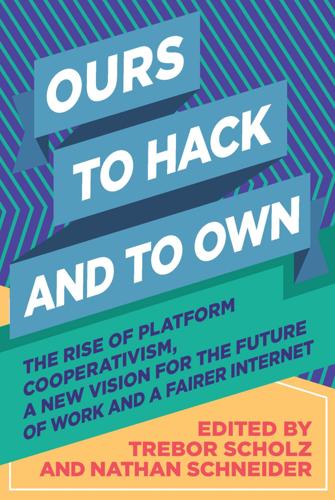
Ours to Hack and to Own: The Rise of Platform Cooperativism, a New Vision for the Future of Work and a Fairer Internet
by
Trebor Scholz
and
Nathan Schneider
Published 14 Aug 2017
Practice and theory are providing the cultural framework within which people can come to believe that cooperativism can in fact work, on a mass scale, for important swaths of their Internet-mediated social practice. Third, commons-based peer production has provided a template and experience with the possibility of large-scale enterprises managing and governing themselves through online cooperative platforms. They offer extensive and growing experience with how networked peers govern themselves, allocate work and responsibility, and manage day-to-day operations across time and space. Peer cooperativism shares these core governance and organizational patterns with commons-based peer production, but its defining feature, enabling workers to make a living from their cooperative work, presents distinct challenges that peer production has not had to face.
…
Peer production has thrived on pooling voluntary contributions of participants who had other means of making a living. This allowed commons-based peer production to release its outputs mostly free of charge, as well as “free as in freedom.” Peer cooperativism, if it is to become part of the solution to the increased economic insecurity for the many in the twenty-first century, must be able to sustain cooperation while charging customers and users a price and fairly distributing the proceeds among the peers. This is a challenge that commons-based peer production did not face. The established cooperative movement has shown that the challenge is not insurmountable, but it is real.
…
If feudalism was based on the ownership of land by an elite, the resource now controlled by a small minority is networked data. We cannot, therefore, be content with cooperative alternatives designed to counter mere capitalism. Commons-based peer production, a term coined by Yochai Benkler, has brought about a new logic of collaboration between networks of people who freely organize around a common goal using shared resources, and market-oriented entities that add value on top of or alongside them. Prominent cases of commons-based peer production, such as the free and open-source software and Wikipedia, inaugurate a new model of value creation, different from both markets and firms.
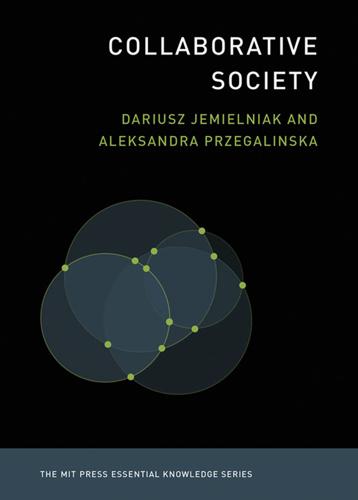
Collaborative Society
by
Dariusz Jemielniak
and
Aleksandra Przegalinska
Published 18 Feb 2020
For instance, Italy passed a bill in 2016 that defines the sharing economy as an “economic system generated by the optimization and shared allocation of space, time, goods, and services through digital platforms.”26 Similarly, the EU Commission defined collaborative economy as a brokerage between individual service providers and recipients.27 Even more important in the general discourse are the plethora of authors who believe that collaborative economy—particularly commons-based peer production—has the potential to transform the capitalistic system and the whole of society into something much less corporate driven and more equality based.28,29 Proponents of open collaboration argue that online connectivity allows provisioning based on access rather than ownership, which enables better use of previously underutilized assets like cars, private rooms, apartments, and tools.30,31 The thriving marketplace that exists as a result, they say, transfers the burden of maintenance to the provider while the sharing platform reaps the benefits.
…
Some call these ventures platform cooperativism because they depend on digital technologies to intermediate between dispersed clients and a network of service providers while emphasizing collaboration and fairness, not only profit generation.40,41 Platform cooperatives rely on shared responsibility for governance and more equitable distribution of profits because involvement in the organization and its financial outcome distinguishes them from platform capitalism. Some free/open source initiatives popularly considered part of a “sharing economy” organize around sharing communities. They often rely on commons-based peer production, which includes open-source endeavors like Wikipedia or Linux. Peer production organizations do not pay their contributors, who participate to learn and earn a reputation—whether professional or communal—as well as to do something good for society.42 Because of this orientation, many peer production enterprises are nonprofits, a form of organization that better suits the contributors’ philosophy.
…
According to Wikipedia in 2019, peer production (also known as mass collaboration) is a way of producing goods and services that relies on self-organizing communities of individuals. Some scholars prefer to view peer production as a phenomenon more typical to online cooperatives that produce free and open outcomes, and thus often use the term commons-based peer production as a way to contrast it with profit-driven peer production.3 In this understanding, it may be a vehicle for redefining capitalism and introducing new models of social value.4 Arguably, peer production appears as the most significant organizational innovation resulting from online cooperative technologies.5 In more modern applications, the peer production approach can be applied to physical goods manufacturing in a “design global, manufacture local” model, which also seeks to challenge the existing political economy and further sustainability through degrowth.6 Furthermore, the phenomenon of peer production can be understood as a technically enabled way to run a social movement focused on creating something for the common good.7 And in that case it can be strongly motivated by ideology.8 An important part of many commons-based peer production initiatives involves a social turn toward more direct interaction and away from mediating institutions.
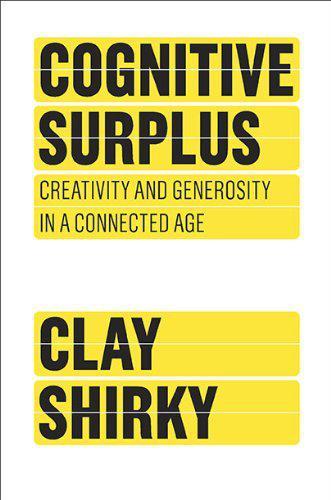
Cognitive Surplus: Creativity and Generosity in a Connected Age
by
Clay Shirky
Published 9 Jun 2010
I was wrong about Geocities because I bet that amateurs would never want to do anything other than consume. (That was the last time I ever made that mistake.) MEMBERSHIP AND GENEROSITY Yochai Benkler, a legal scholar at Harvard, and Helen Nissenbaum, a philosopher at NYU, wrote a paper in 2006 with a mouthful of a title: “Commons-Based Peer Production and Virtue.” Commons-based peer production is Benkler’s term for systems that rely on voluntary contributions to operate—systems that rely on cognitive surplus. In their piece, they describe the positive characteristics that such participation both relies on and encourages. Like Deci, Benkler and Nissenbaum focus on personal virtues like autonomy and competence.
…
Pierce, “Pervasive Negative Effects of Rewards on Intrinsic Motivation: The Myth Continues,” Behavior Analyst 24 (2001): 1-44. 75 philanthropies that use 40 percent of donated money for expenses: The American Institute of Philanthropy, “How American Institute of Philanthropy Rates Charities,” http://www.charitywatch.org/criteria.html (accessed January 9, 2010). 76 not graphics and gore but the feelings of control and competence: Laura Sanders, “Gamers Crave Control and Competence, Not Carnage,” Science News 175.4 (2009): 14. 78 Commons-Based Peer Production and Virtue: Benklar and Nissenbaum’s paper, “Commons-Based Peer Production and Virtue,” appeared in The Journal of Political Philosophy 14.4 (2006): 394-419. 79 growth in postpartum support groups organizing via the internet: Katherine Stone noted the prevalence of postpartum groups in “Postpartum Among Top 10 Fastest Growing Topics at Meetup.com,” Postpartum Progress, October 8, 2009, http://postpartumprogress.typepad.com/weblog/2009/10/postpartum-among-top-10-fastest-growing-topics-at-meetupcom.html (accessed January 9, 2010). 80 And then there’s the section called Thank You: The full name of the Thank You page is “Grobanites for Charity—A Special Thank You!”
…
As with the Ultimatum Game, the default human behavior relies on mutual regard for other participants, even when there’s money to be made. The second thing that has happened is that the emergence of a medium that makes group coordination cheap and widespread caused many of the old limits on social production to recede. This is the mechanism of production that Harvard law professor Yochai Benkler has called “commons-based peer production,” work that is jointly owned or accessed by its participants, and created by people operating as peers, without a managerial hierarchy. The inclusion of millions of new participants in our media environment has expanded the scale and scope of such production dramatically. Where markets and managers have been the preeminent mechanisms for large-scale creation, we can now add this form of social production as a way to take on such tasks, linking our aggregate free time to tasks we find interesting, important, or urgent, using media that now provides opportunities for this kind of production.
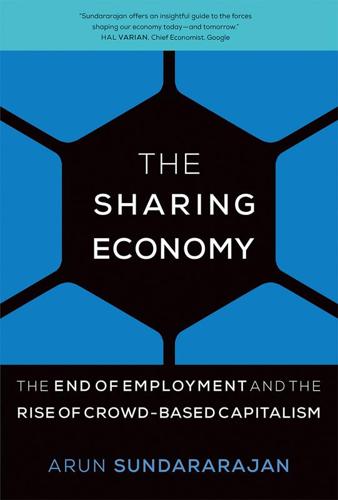
The Sharing Economy: The End of Employment and the Rise of Crowd-Based Capitalism
by
Arun Sundararajan
Published 12 May 2016
Moving forward, he suggests, somewhat presciently, we will need to “adjust our expectations, assumptions, and, ultimately, policy prescriptions to accommodate the emerging importance of social relations in general, and sharing in particular, as a modality of economic production.”22 Benkler’s measured approach to describing the sharing economy contrasts with the more ecclesiastical pronouncements of the scholar Michel Bauwens. While consistent with Benkler’s notion of commons-based peer production, Bauwens’s vision and writing aptly captures not only the strength of resistance from the “purpose-driven” community to the “profit-driven” sectors of the sharing economy that we discussed earlier in this chapter, but also the fervor with which some thinkers and users have embraced the sharing economy.
…
For Botsman and Stephany, and to some extent, Gansky, the role of social cues is contained largely in the creation of trust, reputation, or “digital community” that facilitates economic exchange. For Lessig, the social versus the nonsocial drivers are precisely what draws the line between sharing economies and commercial economies. For Benkler, the social cues are a replacement for economic cues (prices or managerial oversight) in the creation of a third way, commons-based peer production. In many ways, in their thinking about the integration of social aspects into economic exchange and activity, both Benkler and Lessig point frequently to the “gift economies” that have existed for centuries. This is a critical connection. There are numerous parallels between the behaviors I see emerging in the modern sharing economy and what we have observed in these gift economies of the past.
…
Yochai Benkler, “‘Sharing Nicely’: On Shareable Goods and the Emergence of Sharing as a Modality of Economic Production,” http://benkler.org/SharingNicely.html. First published in Yale Law Journal 114 (2004): 273–358, 278. 19. Ibid. This observation built on Benkler’s earlier notion of “commons-based peer production,” introduced in his essay “Coase’s Penguin, or, Linux and the Nature of the Firm,” Yale Law Journal 112 (2002): 369, where he discusses the peer production that characterizes, for example, open-source information projects like Wikipedia or open-source software like Linux. Benkler situates these as a third alternative to market-based and hierarchy-based forms of organizing economic activity, one that creates sufficient gains (in information and in allocation) that compensate sufficiently for the “information exchange costs due to the absence of pricing and managerial direction and the added coordination costs created by the lack of property and contract.”

Working in Public: The Making and Maintenance of Open Source Software
by
Nadia Eghbal
Published 3 Aug 2020
WHY WE PARTICIPATE IN THE COMMONS Ostrom’s work on the commons helps us understand the conditions in which people produce software collaboratively: the clubs and federations of open source. In the early 2000s, Yochai Benkler expanded upon Ostrom’s model by applying her findings to the online world. He terms this communal structure commons-based peer production (CBPP) in a 2002 essay called “Coase’s Penguin, Or, Linux and ‘The Nature of the Firm.’” (The title is a reference to Linux’s mascot, which is a penguin; in the paper, Benkler leans heavily upon the example of open source software to make his case.) Benkler observed that people were collaborating online for seemingly no obvious reason beyond personal satisfaction.
…
One person shouts, “Januarys, over here!,” while another raises their hand for the March birthdays. Once everyone is clustered by month, the subgroups organize themselves by day, before finally adding their sections back into the main group. Coase’s theory of the firm looks more like the former approach, while Benkler’s commons-based peer production resembles the latter. In terms of coordination effort, it could be less costly to designate one person as the leader, whose job it is to collect information from everyone and keep all the work in one place. But when you have a group of strangers who are loosely affiliated with one another and excited to participate, and nobody is officially in charge, it’s more likely that a bunch of people will volunteer all at once.
…
But when you have a group of strangers who are loosely affiliated with one another and excited to participate, and nobody is officially in charge, it’s more likely that a bunch of people will volunteer all at once. Intrinsic motivation makes it easier for people to self-organize to achieve the same outcome. Benkler is careful to emphasize that he does not think that commons-based peer production is always preferable to the firm, but rather yet another possible outcome: I am not suggesting that peer production will supplant markets or firms. I am not suggesting that it is always the more efficient model of production for information and culture. What I am saying is that this emerging third model is (a) distinct from [markets and firms], and (b) has certain systematic advantages over the other two in identifying and allocating human capital/creativity.112 A few of the conditions that Benkler identifies as necessary to pull off commons-based peer production are intrinsic motivation, modular and granular tasks, and low coordination costs.

Speaking Code: Coding as Aesthetic and Political Expression
by
Geoff Cox
and
Alex McLean
Published 9 Nov 2012
This partly explains the motivation for many software producers to reveal the source code as an integral part of their work, particularly in the production of codeworks previously mentioned. A number of other examples are introduced, especially work by artists and programmers keen to offer alternatives to mainstream development, ranging from the performances of the livecoding scene to commons-based peer production. These demonstrate that new ideas emerge through wider recursive processes, which reflect the communicative and linguistic dimensions of work and action. If the first chapter established that code was Double Coding 13 speechlike, then this chapter further establishes that speech has become more codelike under the conditions of informational capitalism, especially when work is executed through scores and scripts, something that Paolo Virno argues in building upon Arendt’s work.50 Taking Virno’s line of argument, the relationship of capital to language also helps to establish how working can be understood as speech acts, facilitated by networked communications technologies and collective formations of work.
…
A contemporary example is the development of the GNU/Linux operating system, where each individual’s work is valued in the context of the multiple efforts of all contributors, although the relations are still expressed between people and things with copyleft/GNU GPL.41 Even enlightened public domain licenses, as noted in chapter 2, are paradoxically locked into legal frameworks that treat ideas as objects rather than processes. To Leach, this necessitates a critique of current ideas on valorization that disregard a deeper understanding of creative processes and commons-based production.42 Commons-based peer production is one model of collective creation in this respect, challenging traditional descriptions of productive activities and standard organizational forms that turn social relations into proprietary objects. There is indeed heady speculation on the social implications of peer production and the way it poses problems for traditional understandings of organizational structures and the productive activities of publics.
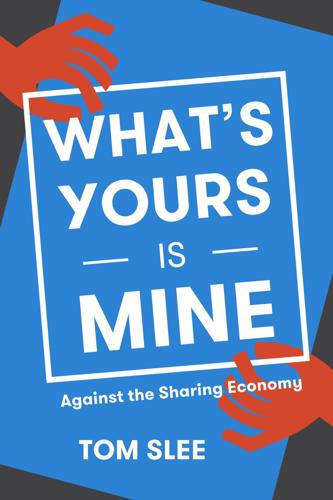
What's Yours Is Mine: Against the Sharing Economy
by
Tom Slee
Published 18 Nov 2015
Yochai Benkler made an academic case for peer networks in his essay “Coase’s Penguin: Linux and the Nature of the Firm” and then in his influential book The Wealth of Networks, holding up Linux as the archetype of a new form of production that could reshape economies.3 The traditional economy is driven, in this view, by markets and by hierarchical firms or state organizations, but Benkler saw a third possibility, which he labeled “commons-based peer production.” “Commons-based” because the result is not owned by anyone; “peer production” because those who take part do so as peers. In “Coase’s Penguin,” Benkler describes the puzzle of why people contribute to Linux and other efforts: Programmers do not generally participate in a project because someone who is their boss instructed them, though some do.
…
Wikipedia is so identified with web-based collaboration that its name has been incorporated into book titles (Wikinomics: How Mass Collaboration Changes Everything) and related initiatives such as the leaked document site WikiLeaks. In Benkler’s The Wealth of Networks, Wikipedia plays a prominent role as an exemplar of “commons-based peer production.” But Wikipedia turned out to be more the exception than the rule. While there are other not-for-profit large-scale collaborative platforms (OpenStreetMap, for example), no other non-commercial site has reached anything resembling Wikipedia’s influence. As Sue Gardner, then Executive Director of the Wikimedia Foundation, wrote in 2011: Wikipedia represents the fulfilment of the original promise of the internet: that it’s a kind of poster child for online collaboration in the public interest.
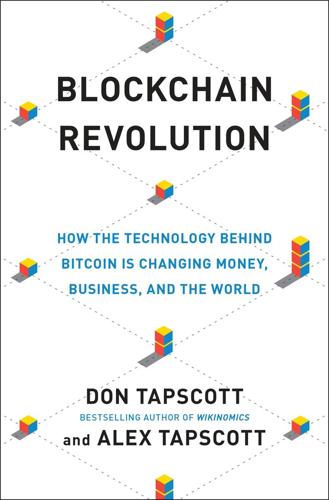
Blockchain Revolution: How the Technology Behind Bitcoin Is Changing Money, Business, and the World
by
Don Tapscott
and
Alex Tapscott
Published 9 May 2016
Community members participate for the fun of it, as a hobby, to network, or because of their values. Now, by enabling reputation systems and other incentives, blockchain technology can improve their efficiency and reward them for the value they create. Peer production communities can be “commons-based peer production,” a phrase coined by Harvard Law professor Yochai Benkler.18 Sometimes called social production, also Benkler’s term, this system means that goods and services are produced outside the bounds of the private sector and are not “owned” by a corporation or individual. Among the countless examples are the Linux operating system (owned by no one but now the most important operating system in the world), Wikipedia (owned by the Wikimedia Foundation), and the Firefox Web browser (owned by the Mozilla Foundation).
…
Interview with Andreas Antonopoulos, July 20, 2015. 16. Ibid. 17. Don Tapscott and Anthony D. Williams, Wikinomics: How Mass Collaboration Changes Everything (New York: Portfolio/Penguin, 2007). Wikinomics defined seven such business models. The list has been extended here. 18. Commons-based Peer Production is a term developed by Harvard Law professor Yochai Benkler in the seminal article “Coase’s Penguin,” The Yale Law Journal, 2002; www.yale.edu/yalelj/112/BenklerWEB.pdf. 19. http://fortune.com/2009/07/20/information-wants-to-be-free-and-expensive/. 20. Interview with Yochai Benkler, August 26, 2015. 21.
…
Airbnb, 115–17 Big Seven, 128–42 distributed applications, 117–22 distributed autonomous enterprises, 126–28 hacking your future, 142–44 Buterin, Vitalik, 87–88, 262, 278–80 autonomous agents, 123, 125 consensus mechanisms, 31 futarchy, 220 re-architecting the firm, 18, 87–88, 96, 100–101 Buzzcar, 137 Byrne, David, 227 Byrne, Patrick, 83 Byzantine Generals’ Problem, 241 Cabell, James Branch, 277 California Public Employees’ Retirement System, 77 Campus microgrids, 148 “Canonical persona,” 16, 140 Cap-and-trade system, 222–23 Capital in the Twenty-First Century (Piketty), 173, 175 Carlyle, James, 69 Cars, 137, 164–67, 165–67 Cavoukian, Ann, 27, 28, 41, 42, 51–52, 275 CBW Bank, 73 Ceglowski, Maciej, 254, 275 Central banks (banking), 9, 31, 57, 286–87, 293–96, 309 Cerf, Vint, 274, 281, 299 Chain (company), 67–68 Chamber of Digital Commerce, 208, 287, 288, 302, 303 Change.org, 304 Chase, Robin, 137 Chaum, David, 4, 219 Chesky, Brian, 135 China, 13, 56, 174, 243–45, 264, 266–67, 272 Choi, Constance, 288, 307 Christie, Chris, 98 Circle, 83, 284 Circle Internet Financial, 71–72 Cisco Quad, 139 Civil Justice Council, U.K., 221 Clark, David, 281 Clark, Jeremy, 215 Climate change, 149, 221–23 Cloud computing, 118, 122 Coalition for Automated Legal Applications (COALA), 301–2, 303 Coase, Ronald, 74, 92–93, 100, 105, 121, 142, 319n Cohen, Bram, 119, 262 Coinbase, 44, 83–84, 284, 302 Coin Center, 286, 287, 302, 303 CoinPip, 217 Collaboration, 139–42 Collins, John, 302 Colu, 238 CommitCoin, 215 “Commons-based peer production,” 129 Competitive advantage, 64, 66, 110–11, 140 Complex instruction set computer (CISC), 260–61 CompuServe, 118 Computer viruses, 122, 123 Computing, evolution of, 150–52 Conflict adjudication, 100, 105, 219, 221 Conflicts of interest, 100, 125 Consensus mechanisms, 30–33, 36–37, 95, 98, 262, 266, 305 Consensus Systems (ConsenSys), 15, 87–92, 99, 101, 112–14, 130 Consideration, 10, 30 Conspiracy theories, 213 Content ID, 235 Contract breaches, 104, 258 Contracting costs, 99–101 Contracts.
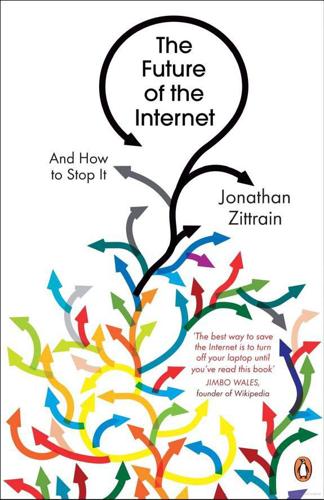
The Future of the Internet: And How to Stop It
by
Jonathan Zittrain
Published 27 May 2009
And they can ameliorate some of the inequalities that markets have often generated and amplified.”). 65. Yochai Benkler, Sharing Nicely: On Shareable Goods and the Emergence of Sharing as a Modality of Economic Production, 114 YALE L.J. 273 (2004). 66. See Yochai Benkler & Helen Nissenbaum, Commons-based Peer Production and Virtue, 14 J. POL. PHIL. 394 (2006) (arguing that socio-technical systems of commons-based peer production offer not only a remarkable medium of production for various kinds of information goods, but also serve as a context for positive character formation, as a society that provides opportunities for virtuous behavior is one that is more conducive to virtuous individuals, and suggesting that the practice of effective, virtuous behavior may lead to more people adopting the virtues as their own, or as attributes of what they see as their self-definition). 67.
…
See Meyers, supra note 82; Wikipedia, Ward Cunningham, http://en.wikipedia.org/ wiki/Ward_Cunningham (as of May 10, 2007, 13:31 GMT); Wikipedia, Wiki, http://en.wikipedia.org/wiki/WikiWiki (as of May 16, 2007, 23:11 GMT). 85. See Wikipedia, Wiki, supra note 84; Wikipedia, Wikipedia, http://en.wikipedia.org/ wiki/Wikipedia#History (as of May 16, 2007, 15:44 GMT). 86. For further discussion of commons-based peer production (including an examination of free software and Wikipedia) as an alternate economic modality, see Benkler, supra note 65, at 334—36. 87. There is evidence this is, in fact, already occurring. See DON TAPSCOTT & ANTHONY D. WILLIAMS, WIKINOMICS: HOW MASS COLLABORATION CHANGES EVERYTHING (2006); Chrysanthos Dellarocas, Strategic Manipulation of Internet Opinion Forums: Implications for Consumers and Firms, 52 MGMT.
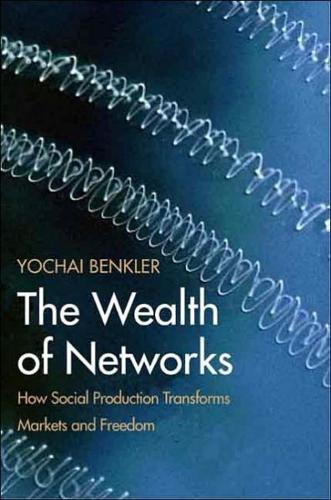
The Wealth of Networks: How Social Production Transforms Markets and Freedom
by
Yochai Benkler
Published 14 May 2006
It suggests that the networked environment makes possible a new modality of organizing production: radically decentralized, collaborative, and nonproprietary; based on sharing resources and outputs among widely distributed, loosely connected individuals who cooperate with each other without relying on either market signals or managerial commands. This is what I call "commons-based peer production." 121 "Commons" refers to a particular institutional form of structuring the rights to access, use, and control resources. It is the opposite of "property" in the following sense: With property, law determines one particular person who has the authority to decide how the resource will be used.
…
Science is built by many people contributing incrementally--not operating on market signals, not being handed their research marching orders by a boss--independently deciding what to research, bringing their collaboration together, and creating science. What we see in the networked information economy is a dramatic increase in the importance and the centrality of information produced in this way. 125 Free/Open-Source Software 126 The quintessential instance of commons-based peer production has been free software. Free software, or open source, is an approach to software development that is based on shared effort on a nonproprietary model. It depends on many individuals contributing to a common project, with a variety of motivations, and sharing their respective contributions without any single person or entity asserting rights to exclude either from the contributed components or from the resulting whole.
…
It is sufficient that the policy is economically and socially sustainable on its own bottom--in other words, that it does not require constant subsidization at the expense of some other area excluded from the analysis. It is nonetheless worthwhile spending a few pages explaining why, and under what conditions, commons-based peer production, and social production more generally, are not only sustainable but actually efficient ways of organizing information production. 210 The efficient allocation of two scarce resources and one public good are at stake in the choice between social production--whether it is peer production or independent nonmarket production--and market-based production.
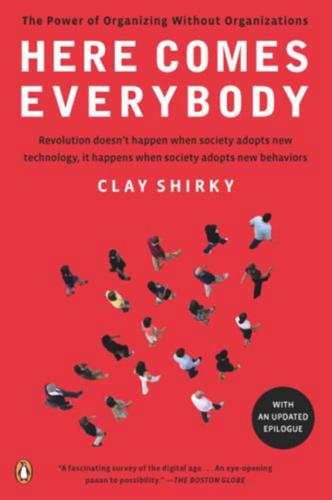
Here Comes Everybody: The Power of Organizing Without Organizations
by
Clay Shirky
Published 28 Feb 2008
The genius of wikis, and the coming change in group effort in general, is in part predicated on the ability to make nonfinancial motivations add up to something of global significance. Yochai Benkler, a legal scholar and network theorist and author of The Wealth of Networks, calls nonmarket creation of group value “commons-based peer production” and draws attention to the ways people are happy to cooperate without needing financial reward. Wikipedia is peer production par excellence, set up to allow anyone who wants to edit an article to do so, for any and all reasons except getting paid. There’s an increasing amount of evidence, in fact, that specific parts of our brain are given over to making economically irrational but socially useful calculations.
…
Page 129: fame I made earlier drafts of these arguments in the essays, “Communities, Audiences, and Scale”, www.shirky.com/writings/community_scale.html, and “Why Oprah Won’t Talk To You. Ever.”, in Wired Magazine (August, 2004.) Page 133: Yochai Benkler’s The Wealth of Networks: How Social Production Transforms Markets and Freedom, Yale University Press (2006) links economics with political and legal theory, sketching out a vision of a world where “commons-based peer production” is allowed to flourish. Page 136: Wikipedia deletion and restoration Martin Wattenberg and Fernanda B. Viégas’s work on visualizing the history of Wikipedia edits, “History Flow,” is at www.research.ibm.com/visual/projects/history_flow/. Page 138: Seigenthaler and essjay controversies The Wikipedia articles on the controversy surrounding the John Seigenthaler entry (en.wikipedia.org/wiki/John_Seigenthaler_Sr.
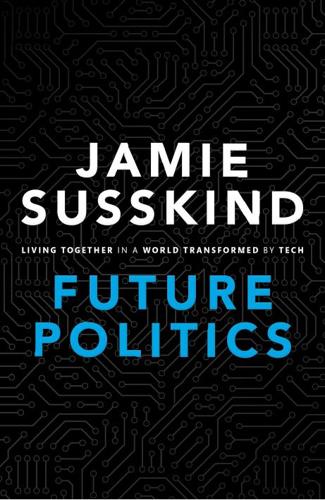
Future Politics: Living Together in a World Transformed by Tech
by
Jamie Susskind
Published 3 Sep 2018
The code is curated by nearly 12,000 contributors, each working on the premise that any technical problem—no matter how difficult—can be solved if enough people are working on it. Where it is undertaken without topdown control, this kind of activity has been called commons-based peer production or open-source production.50 Where there’s more central direction and control, it tends to be called crowdsourcing. In the digital lifeworld it will be possible, using commons-based peer production or crowdsourcing, to invite the citizenry directly to help set the political agenda, devise policies, and draft and refine legislation. Advocates of this sort of democracy, or variants of it, have called it wiki-government, collaborative democracy, and crowdocracy.51 I refer to it as Wiki Democracy.
…
K. 370 Chicago 130 Chin, Josh 397, 422 China Beijing’s toilet paper dispensers 51 censorship 148, 156 credit ratings 140, 290 hackers 181 perception-control 146, 148, 156 printing technology, introduction of 20 Qin dynasty 131 WeChat 148, 319 Christiano, Thomas 415 Chui, Michael 424, 425 Churchill, Winston 82, 202, 203, 226, 390 Cicero 167, 168, 324, 429 Cisco Systems 43, 378 cities scrutiny 129–30 smart see smart cities Citron, Danielle Keats 351, 419, 432 civil justice 259 Clark, Justin 405 Clarke, Arthur C. 69, 388 class-based discrimination 281 classical democracy 214–16, 254 Clausewitz, Carl von 71–2 Clinton, Bill 271 Clinton, Hillary 233 clocks 14–15 cloud computing commons 332 Data Deal 337 hacking by the state 156 machine learning 37 utility analogy 158 Cloudflare 236 OUP CORRECTED PROOF – FINAL, 28/05/18, SPi РЕЛИЗ ПОДГОТОВИЛА ГРУППА "What's News" VK.COM/WSNWS Index CNN Wire 370, 420 Cocco, Federica 424 code 266 and algorithms 94–5 ‘dark’ 194 empire 97–8, 118 future 98 as law 96 as power 95–7, 154–5 and values 117 well-coded society 292–4 code-ified law 110–12, 245 coercion 93 code 96 and immorality 203 law enforcement 104, 105 Cohen, Jared 374, 376, 384, 385, 398, 435 Cohen, Julie E. 391, 432 Coke, Sir Edward 135 Cold War 133 Coleman, E. Gabriella 180, 181, 404 collaborative democracy see Wiki Democracy Collini, Stefan 407 Collins,Victor 134 command economy 265, 329 commons 331–4, 335 commons-based peer production 244 communication liberty and private power 190–1 perception-control 148, 150–1, 229 communism 12 ‘fully automated luxury’ 328 community, freedom of see republican freedom companionship, as robot function 55 Compas 174 competition law 357 competitive elitism 217–19, 221, 240, 242, 253, 254 Computerscience.org 423 computing power, growth in 37–41 Comte, Auguste 170, 175, 177, 250, 403, 417 concentration camp inmates 131 495 concentration of wealth and power 318–22, 329–30 sharing economy 336 conceptual analysis 81–3, 84–5 Condliffe, Jamie 375 Condorcet, Marquis de 224 Conger, Krista 372 connectivity of technology 44–8 Connolly, William E. 390 consent principle 351–2, 353, 355, 357 Constant, Benjamin 128, 395 constitutive nature of technology 53–7 contextual analysis 84–5 contracts, smart see smart contracts Cooper, Daniel 402 Copernicus, Nicolaus 14 copyright 324, 332, 333 infringement 156 Cornell University 57 correlation/causation fallacy, rule-based injustice 284 corruption 82, 84, 225, 329, 361 Costeja González, Mario 138 Couldry, Nick 421 counters (democracy theorists) 224–5 Crawford, Kate 418 Creative Commons 45 credit scores 267 Crete-Nishihata, Masashi 399 Crick, Bernard 72, 389, 408 criminal justice 259 Cronologics 319 Cross, Tim 375 Crossley, Rob 388 crowdocracy see Wiki Democracy Crowdpac 417 crowds, wisdom of see wisdom of crowds crowdsourcing 244 cryptography 182–4 Cukier, Kenneth 387, 388, 395, 397, 403, 427, 433 data 62, 65 forgetting versus remembering 137 cultural oppression 273 OUP CORRECTED PROOF – FINAL, 28/05/18, SPi РЕЛИЗ ПОДГОТОВИЛА ГРУППА "What's News" VK.COM/WSNWS 496 Index Dabate, Connie and Richard 134–5 Dahir, Abdi Latif 405 Dahl, Robert A. 91, 390, 391, 411, 430 Daily Stormer 236 D’Ancona, Matthew 239, 412, 415 Dandeker, Christopher 391 Darknessbot 234 data as capital 317 increasingly quantified society 61–7 data-based injustice 282 Data Deal 66, 336–40, 358 Data Democracy 212, 246–50, 254, 348 datafication 62–7 data storage digitization 62 nanotechnology 56 usufructuary rights 330 data unions 340 Dayen, David 427 Dean, Sarah 402 Decentralised Autonomous Organisations (DAOs) 47 Deep Knowledge Ventures 31, 251 Defense Advanced Research Projects Agency (DARPA) 47, 178 De Filippi, Primavera 120, 378, 392, 393, 394 Delaney, Kevin J. 425, 430 delegation AI Democracy 252 Direct Democracy 242 Deleuze, Gilles 395 Delft University 56 Deliberative Democracy 212, 227–39, 254, 348 democracy 3, 10, 23–4, 346, 359–60 after the internet 219–21 AI Democracy 212, 213, 250–4, 348 arguments for 222–6 classical 214–16, 254 competitive elitism 217–19, 221, 240, 242, 253, 254 concept 74–6 conceptual analysis 81, 82, 84–5 contextual analysis 84–5 Data Democracy 212, 246–50, 254, 348 Deliberative Democracy 212, 227–39, 254, 348 Direct Democracy 212, 239–43, 254, 348 dream of 211–26 epistemic superiority 223–4, 234 in the future 227–54 liberal 216–17, 246, 254 and liberty 207–8, 222, 225, 249 liquid 242 nature of 213 normative analysis 84–5 representative 218, 240, 248 stability 240 story of 213–21 supercharged state, power of the 348 Wiki Democracy 212, 243–6, 254, 348 DemocracyOS 242, 415 Democratic Party (US) 229 desert, justice as 260–1 Desert Wolf 404 Desrosières, Alain 369, 370 Devlin, Patrick 202, 203, 204, 407, 408 Diamandis, Peter H. 374, 435 Dickens, Charles 211 dictatorship 71 Digital Confederalism 193, 205–6, 341 structural regulation 357, 358 digital disrespect 276 digital dissent 179–84 digital filtering see filtering digital law 100–14 Digital Liberalism 205 Digital Libertarianism 205 digital liberty 205–7 digital lifeworld algorithmic injustice 279, 285, 290, 292–4 code’s empire 97 democracy 212–13, 222, 227–54 OUP CORRECTED PROOF – FINAL, 28/05/18, SPi РЕЛИЗ ПОДГОТОВИЛА ГРУППА "What's News" VK.COM/WSNWS Index distributive justice 266, 269 force 100–1, 103, 107–8, 113, 116, 118–19, 121 freedom and the tech firm 188–90, 193–4, 196, 198, 200, 208 increasingly capable systems 29–41 increasingly integrated technology 42–60 increasingly quantified society 61–8 individual responsibility 346–7 justice in recognition 276–8 liberty 168–72, 180, 183, 185, 187 limits 360–1 perception-control 146–52 post-politics 362, 366 power 98–9, 345–6 property 314–17, 320, 322–3, 328–31, 334–6, 340–1 public and private power 154, 156, 158, 160 regulation 354, 357 scrutiny 123, 127–41 social justice 258–9 technological unemployment 295, 304, 306, 311 thinking like a theorist 69–86 Digital Millennium Copyright Act 1988 430 Digital Moralism 206 Digital Paternalism 198, 199, 206 digital ranking 276–8 Digital Republicanism 206–7, 347 structural regulation 357 Digital Rights Management (DRM) technology 96, 102, 105, 172, 333 digital storage 129 digitization 62 of force 100, 101–14 Direct Democracy 212, 239–43, 254, 348 disabilities, people with digital liberation 169 as victims of violence crimes 273 Discord 236 discrimination 497 algorithmic 281–2 rule-based injustice 284, 287–8 disrespect, digital 276 dissent, digital 179–84 distributed computing see smart devices distributive justice 257–70, 274, 278 Data Deal 337 Private Property Paradigm 326 Divine Rule 349 DNA 64, 362 Dodge, Martin 391 Domesday Book 16–17, 369 dominant goods 154 Domingos, Pedro 373, 374, 410, 417, 432 computing power, growth in 38 data unions 340 machine learning 34–5 Drahos, Peter 431 Dredge, Stuart 384, 385 driverless vehicles see self-driving vehicles drones force 106 hacking 183 increasingly integrated technology 54, 55 productive technologies 316 sharing economy 335 totalitarianism 179 utility analogy 158 Dryzek, John S. 368 Dunn, John 408, 409 Durkheim, Émile 61 Dvorsky, George 384 Dworkin, Gerald 171, 352, 401, 402, 432 Dwoskin, Elizabeth 433 Dwyer, Paula 428 Ebay 102 Economist 378, 379, 380, 381, 397, 422 Edelman, Benjamin 423 e-Democracia Wikilegis 244 Edwards, Cory 371 OUP CORRECTED PROOF – FINAL, 28/05/18, SPi РЕЛИЗ ПОДГОТОВИЛА ГРУППА "What's News" VK.COM/WSNWS 498 Index egalitarianism 259, 261–5 egalitarian plateau 259 e-government 220 Egypt 19, 183 Eisenstein, Elizabeth 62, 387 Ekbia, Hamid R. 431 Electrick spray paint 51 Electronic Frontier Foundation 406 Eliot, T.
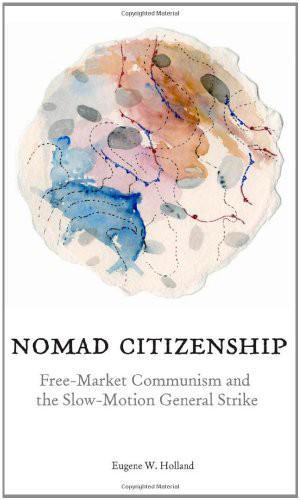
Nomad Citizenship: Free-Market Communism and the Slow-Motion General Strike
by
Eugene W. Holland
Published 1 Jan 2009
A now-classic analysis of capitalist production spearheaded by Ronald Coase in the 1930s and developed subsequently by Oliver Williamson and others examined the relative transaction costs to a business firm of buying goods and services on the open market compared to hiring people to produce those same goods and services within the firm.95 Where transaction costs of buying on the open market are high, production is integrated into the firm and triggered by managerial command; where they are low, production is out sourced and triggered by market pricing mechanisms. Commons-based peer production breaks completely free of this paradigm: participating programmers are not paid for their contributions, nor are they told what to do by some supervising manager. Instead, they engage and contribute on their own free initiative. It is worth being clear in this regard about the role of Linus Torvald in the peer-production process, for he is nothing like an orchestra conductor: programmers are not obeying his commands to write or patch a certain piece of software; this is taken care of immanently and voluntarily through the mediation of Web sites like SourceForge and Savannah.
…
Indeed, the FOSS movement fulfills most of Follett’s criteria for self-organizing business groups, with the important difference that FOSS participants form a so-called virtual community and, as a rule, never meet one another face-to-face. Given its Remarkable success in the realm of knowledge and informa tion, Internet-mediated commons-based peer production is an Important alternative to the now-dominant but clearly threatened capitalist mode of organizing knowledge production, appropriation, exploitation, and dis semination, and it represents an Important instance, alongside neighbor hood organizations and flat-hierarchy business management, of a nomadic organization of the social field.
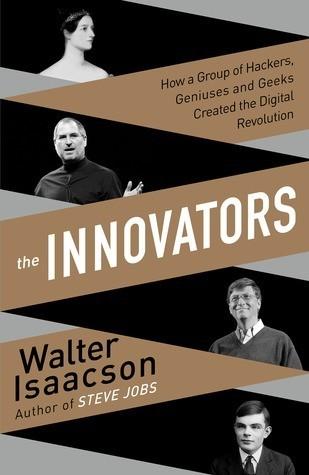
The Innovators: How a Group of Inventors, Hackers, Geniuses and Geeks Created the Digital Revolution
by
Walter Isaacson
Published 6 Oct 2014
“Who would have thought that a world-class operating system could coalesce as if by magic out of part-time hacking by several thousand developers scattered all over the planet, connected only by the tenuous strands of the Internet?”146 Not only did it become a great operating system; it became a model for commons-based peer production in other realms, from Mozilla’s Firefox browser to Wikipedia’s content. By the 1990s there were many models for software development. There was the Apple approach, in which the hardware and the operating system software were tightly bundled, as with the Macintosh and iPhone and every iProduct in between.
…
Wikipedia, though, is even odder than the market: not only is all that material contributed for free, it is available to you free.”107 The result has been the greatest collaborative knowledge project in history. So why do people contribute? Harvard Professor Yochai Benkler dubbed Wikipedia, along with open-source software and other free collaborative projects, examples of “commons-based peer production.” He explained, “Its central characteristic is that groups of individuals successfully collaborate on large-scale projects following a diverse cluster of motivational drives and social signals, rather than either market prices or managerial commands.”108 These motivations include the psychological reward of interacting with others and the personal gratification of doing a useful task.
…
Throughout history, there has been a third way, in addition to government and private enterprises, that collaborative creativity has been organized: through peers freely sharing ideas and making contributions as part of a voluntary common endeavor. Many of the advances that created the Internet and its services occurred in this fashion, which the Harvard scholar Yochai Benkler has labeled “commons-based peer production.”32 The Internet allowed this form of collaboration to be practiced on a much larger scale than before. The building of Wikipedia and the Web were good examples, along with the creation of free and open-source software such as Linux and GNU, OpenOffice and Firefox. As the technology journalist Steven Johnson has noted, “their open architecture allows others to build more easily on top of existing ideas, just as Berners-Lee built the Web on top of the Internet.”33 This commons-based production by peer networks was driven not by financial incentives but by other forms of reward and satisfaction.

Whiplash: How to Survive Our Faster Future
by
Joi Ito
and
Jeff Howe
Published 6 Dec 2016
The British economist Ronald Coase famously described how the firm could allocate and manage resources better than independent agents in an open market—in “Coase’s Penguin, or Linux and the Nature of the Firm,” Yochai Benkler shows that when collaboration costs are reduced, as in projects like Linux and Wikipedia, allowing people to allocate themselves to projects can create assets and organizations more effectively than top-down and structured companies. He calls this “commons based peer production.”14 This off-the-balance-sheet, below-the-radar, not-part-of-our-GDP explosion of creativity is taking over more and more of our world. Everyone involved in it is at the same time a producer and a consumer, a worker and a manager. Money is just one of the many currencies you need to thrive and be happy in a world that requires and rewards attention, reputation, networks, learning, creativity, and tenacity.
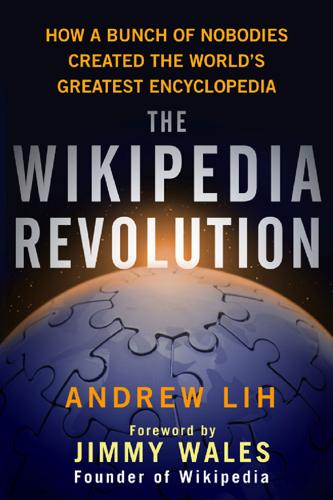
The Wikipedia Revolution: How a Bunch of Nobodies Created the World's Greatest Encyclopedia
by
Andrew Lih
Published 5 Jul 2010
In a widely circulated and famous essay on the Internet called “Coase’s Penguin,” he offered his thinking on why people participate in efforts such as Linux and other “free” projects. There was already a culture, before Wikipedia, of folks donating their time, effort, and skills to the collective good for no monetary gain or immediate compensation. Benkler observed this part of the hacker ethos and was curious to know what the common thread was. He dubbed it “commons-based peer production.” It’s a fancy moniker for the phenomenon of people working together toward the same end—creating computer code or content that is free to be copied, distributed, used, and modified by others. Benkler believes the Internet and the “free culture” movement have allowed individuals to connect and combine their efforts in ways unprecedented in history.
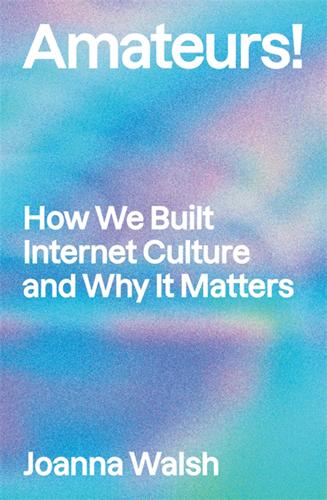
Amateurs!: How We Built Internet Culture and Why It Matters
by
Joanna Walsh
Published 22 Sep 2025
In 1989, Tim Berners-Lee developed the World Wide Web in his spare time while working at CERN. In 1991 Linus Torvalds, then a student at the University of Helsinki, posted to the comp.os.minix newsgroup: ‘I’m doing a (free) operating system (just a hobby, won’t be big and professional).’ Linux was developed as open-source code that relied on what came to be known as commons-based peer production, and it is far from the only volunteer-developed web technology. SHARE was an IBM-run user group founded in 1955 that freely shared the source code of IBM’s early operating systems for user modding, and only ceased operations in 1999. In the early twenty-first century, LiveJournal and Wordpress used open-source software to 216facilitate bloggers’ creativity.
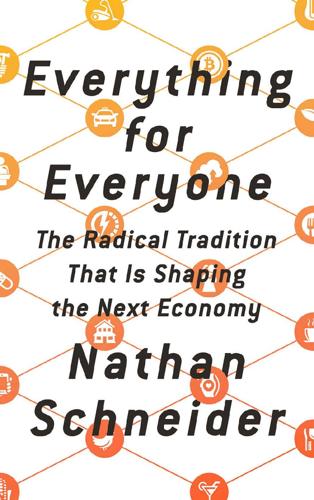
Everything for Everyone: The Radical Tradition That Is Shaping the Next Economy
by
Nathan Schneider
Published 10 Sep 2018
As the feudal system grew top-heavy, networks of merchants prepared the way for the commercial, industrial reordering that followed. With the internet’s networks, he came to believe that industrial civilization faced a crisis of comparable import, as well as the germ of what could come next. He zeroed in on the notion of commons-based peer production—the modes by which online networks enable people to create and share horizontally, not as bosses and employees but as equals. It was a new rendition of the old medieval commons, but poised to become the dominant paradigm, not just a means of survival at the peripheries. He set out to find examples of where this world-transformation was already taking place.
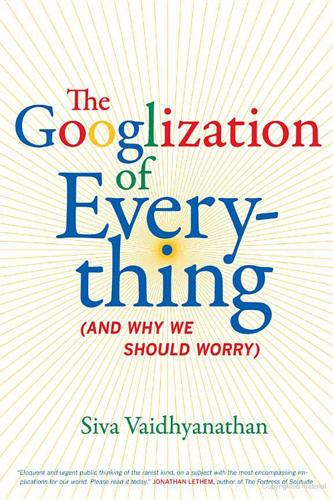
The Googlization of Everything:
by
Siva Vaidhyanathan
Published 1 Jan 2010
At the festival, Page and Brin would have encountered a radically decentralized social structure, one that facilitates creativity, collaboration, and experimentation with little or no “command and control.” Burning Man, Turner concludes, is a distillation of the “cultural infrastructure” that nurtures Google, a spiritual manifestation of what Yochai Benkler calls “commons-based peer production.”51 As the sociologist Dalton Conley has described, many of the most highly rewarded workers—those on the creative side of the technology industries—are either trapped in something like a velvet goldmine or struggling to get into one. They are decontextualized from their localities, overconnected to their mobile, cosmopolitan communities, and constantly striving to improve the speed and quality of those connections.
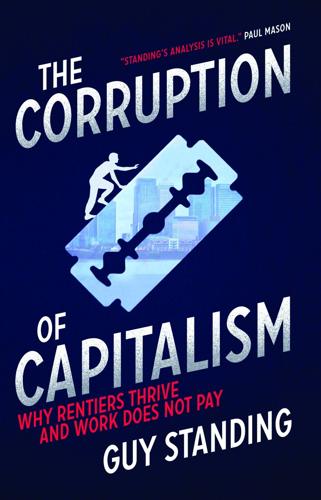
The Corruption of Capitalism: Why Rentiers Thrive and Work Does Not Pay
by
Guy Standing
Published 13 Jul 2016
Rentier platforms are also feeding off the erosion of the social commons and commodifying some of its traditional forms. For instance, by offering cheap taxi rides they may reduce the numbers using subsidised public transport and accelerate the loss of public bus services. The real sharing economy is exciting some analysts. Paul Mason sees the emergence of commons-based peer production in the likes of Wikipedia, Linux, OpenStreetMap and Mozilla’s Firefox. In Spain, arts and culture collectives La Tabacalera and Medialab-Prado are prime examples. While these have great potential, they involve a lot of work by unpaid activists and can be pushed out or marginalised by commercial ventures.

The Caryatids
by
Bruce Sterling
Published 24 Feb 2009
First, the women had to be protected from desperate male violence until a community emerged. The women were grouped and trained with hand tools. The second wave of camp acculturation was designed for the men. It involved danger, difficulty, raw challenge, respect, and honor, in a bitter competition over power tools. It acted on men like a tonic. Like any other commons-based peer-production method, an Acquis attention camp improved steadily with human usage. Exploiting the spex, the attention camp tracked every tiny movement of the user’s eyeballs. It nudged its everyware between the users and the world they perceived. Comparing the movements of one user’s eyeballs to the eyeballs of a thousand other users, the system learned individual aptitudes.
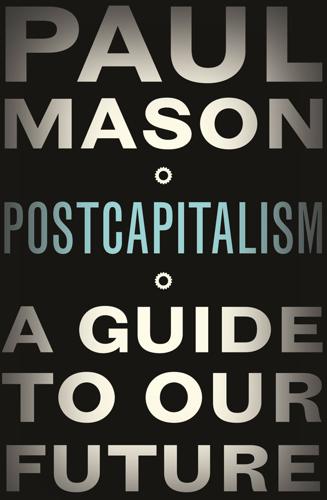
Postcapitalism: A Guide to Our Future
by
Paul Mason
Published 29 Jul 2015
Second, in the collaborative nature of the production process: nobody in a central office decides what the pages should be about; Wikipedia’s employees simply regulate the standards of creation and editing, and defend the whole platform against erosion by property and management hierarchies. Benkler defines this as ‘commons-based peer production’ – and the concept challenges the certainties of mainstream economics some more. Nothing has changed about humanity. It’s just that our human desire to make friends, build relationships based on mutual trust and obligation, fulfilling emotional and psychological needs, has spilled over into economic life.
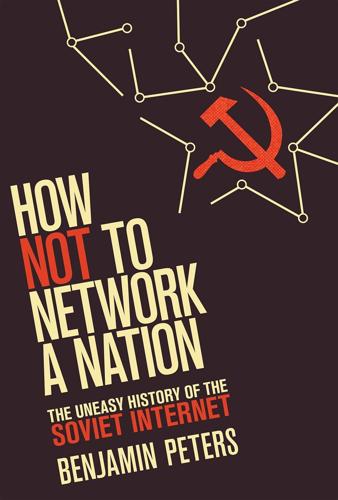
How Not to Network a Nation: The Uneasy History of the Soviet Internet (Information Policy)
by
Benjamin Peters
Published 2 Jun 2016
For example, sociologist Manuel Castells has developed an extensive argument detailing how the Soviet Union failed to enter the information age, which this book is in some ways a sideways response to, and legal scholar Lawrence Lessig used his experience observing the rapid deregulation and privatization in post-Soviet economic transition in the early 1990s as a formative analog for what he felt was an equally disastrous attitude about the supposed unregulability of cyberspace common in the late 1990s.10 Since then, scholars have recognized that the summary experiences of perhaps the last two great information frontiers of the twentieth-century—the rise of post-Soviet economic transition and the Internet—present not, as Francis Fukuyama infamously claimed, the end of history so much as a new chapter in it. Leading cyber legal scholar Yochai Benkler has argued for a middle way by observing how online modes of “commons-based peer production” sustain capitalist profit margins through collectivist forms of reputational altruistic communities that do not depend on individual self-interest.11 From the final chapters of Soviet history, we may begin to observe and puzzle through the perennial fact that, for many Western technologists and scholars, the promise of socialist collaboration shines brightest online today—a promise that the Soviet OGAS designers were among the first to foresee.
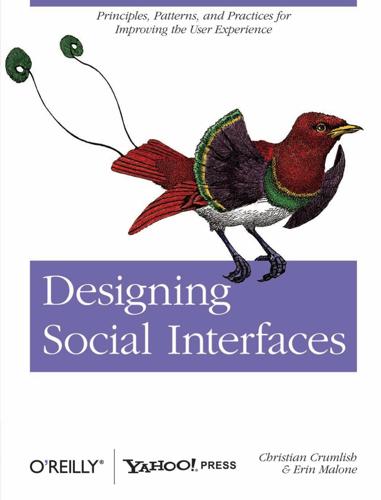
Designing Social Interfaces
by
Christian Crumlish
and
Erin Malone
Published 30 Sep 2009
As seen on Amazon Mechanical Turk (http://www.mturk.com/mturk/welcome) Assignment Zero (http://zero.newassignment.net/) The ESP Game (http://www.cs.cmu.edu/~biglou/ESP.pdf) iStockphoto (http://istockphoto.com) ReCAPTCHA (http://recaptcha.net/) SETI@home (http://setiathome.ssl.berkeley.edu/) Threadless (http://threadless.com) Download at WoweBook.Com 330 Chapter 12: Barnraising Further Reading “Berners-Lee on the read/write web,” BBC News, August 9, 2005, http://news.bbc.co.uk/2/ hi/technology/4132752.stm Cross Cultural Collaboration, http://crossculturalcollaboration.pbwiki.com/ “Deriving Process-driven Collaborative Editing Pattern from Collaborative Learning Flow Patterns,” by Olivera Marjanovic, Hala Skaf-Molli, Pascal Molli, and Claude Godart, http://www.ifets.info/journals/10_1/12.pdf “Edit This Page,” by Dave Winer, http://www.scripting.com/davenet/1999/05/24/editThisPage.html Edit This Page PHP, http://sourceforge.net/projects/editthispagephp/ Paylancers blog, http://paylancers.blogspot.com/ The Power of Many, http://thepowerofmany.com Regulating Prominence: A Design Pattern for Co-Located Collaboration (http://www.ida.liu.se/~matar/coop04arvola-web.pdf) “The Rise of Crowdsourcing,” by Jeff Howe, Wired 14.06, http://www.wired.com/wired/archive/14.06/crowds.html “The Simplest Thing That Could Possibly Work,” by Bill Venners, http://www.artima.com/intv/simplest.html Universal Edit Button, http://universaleditbutton.org/Universal_Edit_Button Wiki Design Principles, http://c2.com/cgi/wiki?WikiDesignPrinciples “The Wiki Way,” by Jon Udell, http://weblog.infoworld.com/udell/2004/10/19.html Wired Crowdsourcing blog, http://crowdsourcing.typepad.com/ Download at WoweBook.Com Chapter 13 Social Media Junkies Unite! Some commons-based peer production efforts are less self-conscious on the part of the users, and emerge more as a function of distributed coordinate behavior, like del.icio.us or Flickr. The critical defining feature of these “enterprises” is that they rely primarily on social information flows, motivations, and relations to organize the group.
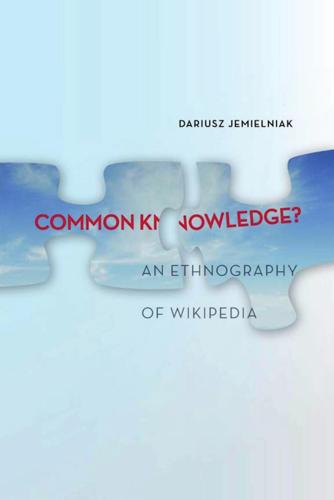
Common Knowledge?: An Ethnography of Wikipedia
by
Dariusz Jemielniak
Published 13 May 2014
Retrieved from http:// www.edge.org/discourse/digital_maoism.html Benkler, Y. (2006b). The wealth of networks: How social production transforms markets and freedom. New Haven, CT: Yale University Press. Benkler, Y. (2011). The penguin and the leviathan: How cooperation triumphs over selfinterest. New York: Crown Business. Benkler, Y., & Nissenbaum, H. (2006). Commons-based peer production and virtue. Journal of Political Philosophy, 14(4), 394–419. Berger, P. L., & Luckman, T. (1967). The social construction of reality: A treatise in the sociology of knowledge. Garden City, NY: Doubleday. Bergquist, M., & Ljungberg, J. (2001). The power of gifts: Organizing social relationships in open source communities.
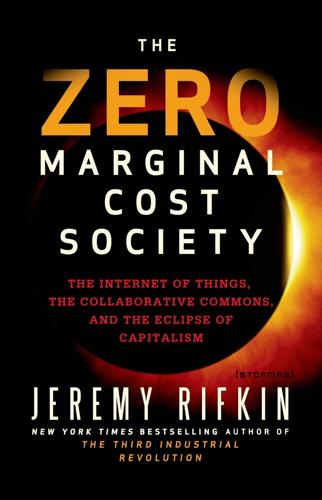
The Zero Marginal Cost Society: The Internet of Things, the Collaborative Commons, and the Eclipse of Capitalism
by
Jeremy Rifkin
Published 31 Mar 2014
Yochai Benkler says that while an inordinate amount of attention is being placed on free software, it is in fact only one example of a much broader social-economic phenomenon. I suggest that we are seeing the broad and deep emergence of a new, third mode of production in the digitally networked environment. I call this mode “Commons-based peer-production,” to distinguish it from the property- and contract-based modes of firms and markets. Its central characteristic is that groups of individuals successfully collaborate on large-scale projects following a diverse cluster of motivational drives and social signals, rather than either market prices or managerial commands.43 Expectations notwithstanding, it would be a mistake to believe that a Commons model will invariably govern the next chapter in the human journey.